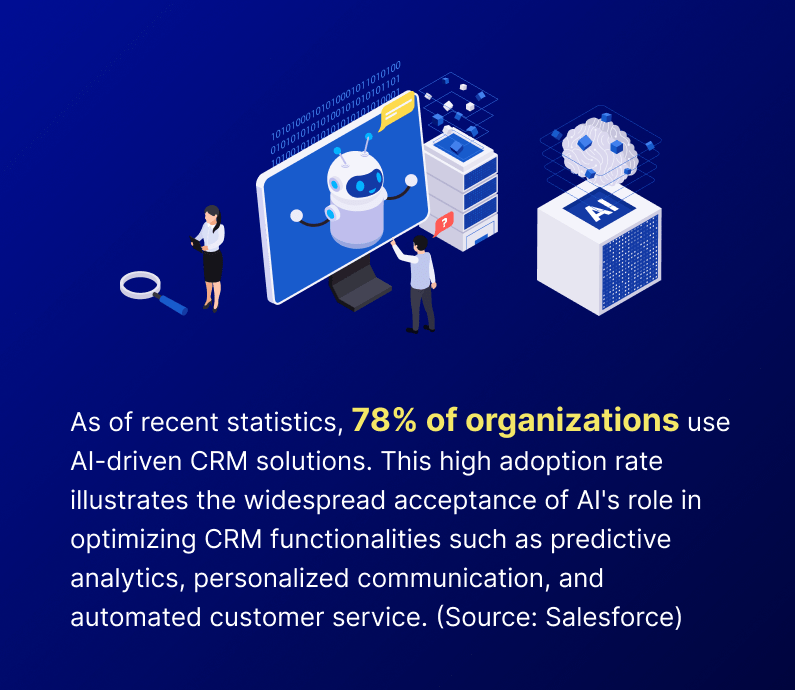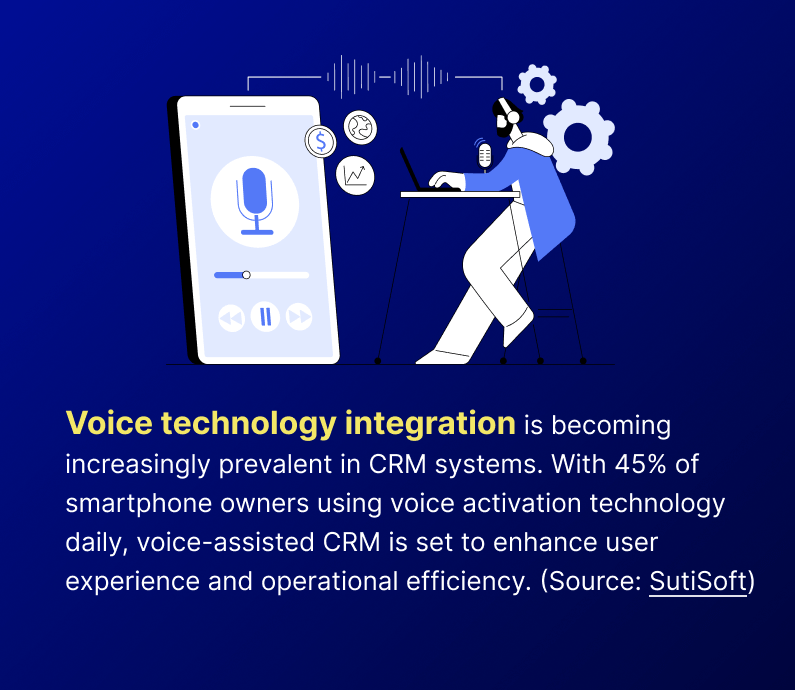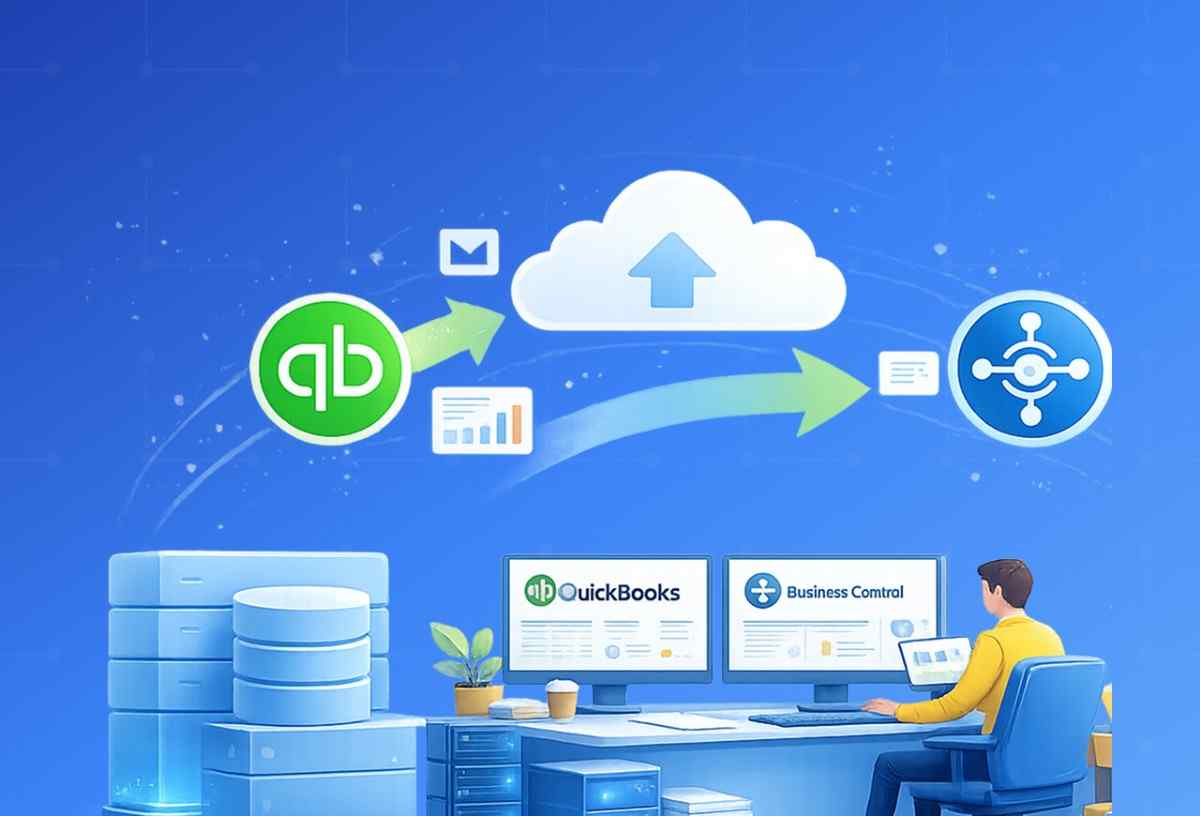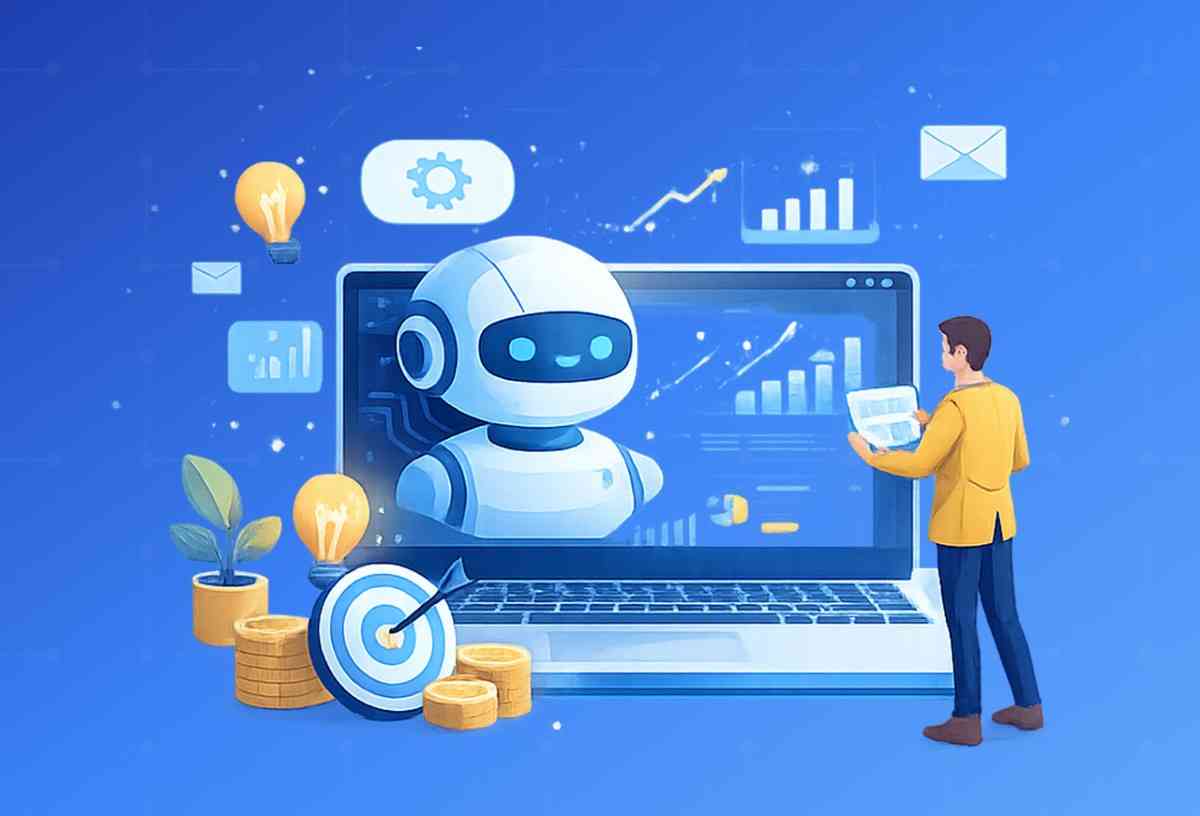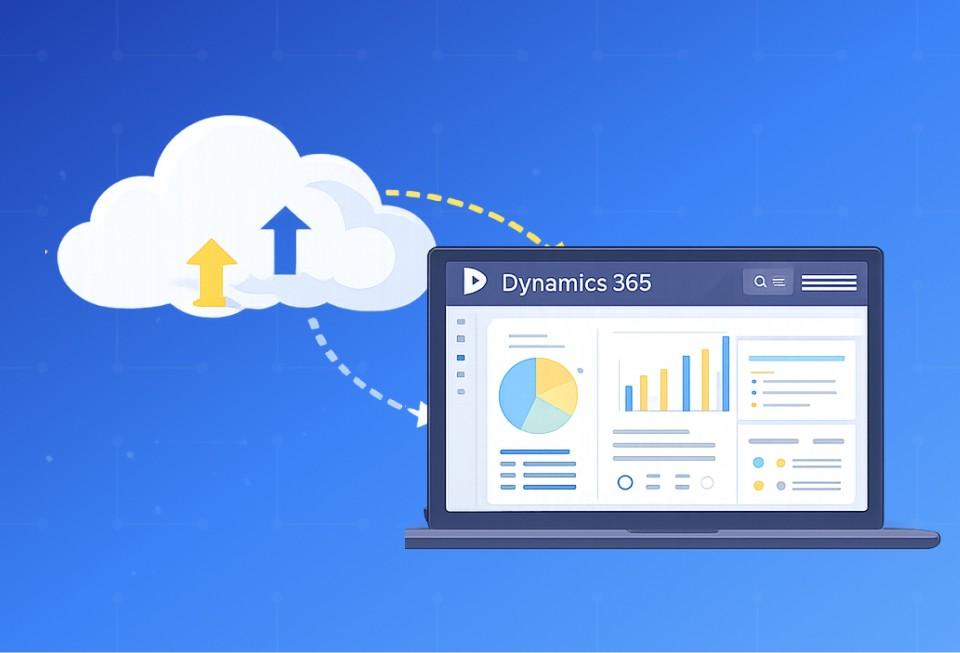Apr 15, 2024 Aiswarya Madhu
The latest CRM trends are focused on leveraging cutting-edge technologies to enhance customer relationship management. These include the integration of artificial intelligence for smarter data processing and personalized customer interactions, the use of blockchain technology for secure data transactions, and the adoption of voice-to-CRM solutions for improved user experiences, and many more.
These emerging trends in CRM reflect a broader industry move towards more dynamic, agile, and customer-centric CRM solutions that can adapt to the evolving needs of businesses and their clientele.
In this CRM industry overview, we delve into the recent trends in CRM that are shaping the market today.
Top 12 CRM Market Trends
1. AI in CRM
AI integration within CRM systems is revolutionizing customer relationship management by leveraging advanced technologies to enhance various aspects of the customer journey.
With AI-driven analytics, CRM platforms can now predict customer behavior, automate responses, and personalize interactions at every touchpoint.
According to recent research, businesses that use AI in their customer journey saw an increase of up to 20% in customer satisfaction.
One of the key benefits of CRM AI trends is its ability to automate mundane tasks traditionally handled by sales executives and marketing professionals. Tasks such as creating marketing materials, transcribing customer calls, and summarizing data can now be efficiently managed by AI algorithms, freeing up valuable time for human employees to focus on more strategic initiatives.
Moreover, AI takes traditional business process automation (BPA) to the next level by automating repeatable processes and operational workflows. This not only improves efficiency but also allows organizations to scale their operations more effectively.
Another crucial application of AI in CRM is data analytics. By analyzing vast amounts of customer data, AI can provide predictive analytics on business outcomes, enabling salespeople to identify untapped markets and make informed decisions. This predictive capability empowers employees to anticipate customer needs and tailor their strategies accordingly.
Furthermore, AI-driven CRM systems facilitate natural language processing, enabling users to engage with the platform using conversational interfaces. This allows salespeople to query the system for insights or guidance using everyday language, such as asking for recommendations or assistance with complex processes. Similarly, customers can interact with AI-powered chatbots to describe their issues and submit service requests seamlessly.
Did you know that Dynamics 365 now features Copilot—an AI assistant designed to boost productivity and streamline workflows across your organization? With Copilot, you can automate tasks, generate insights, and get actionable recommendations using natural language, making it easier than ever to focus on what truly matters. From sales and customer service to finance and supply chain management, Copilot empowers your teams to work smarter and achieve more. Ready to experience the future of business productivity?
Explore AI in Dynamics 365
2. Blockchain for CRM
Blockchain for CRM is an innovative approach that revolutionizes how customer data is managed, stored, and utilized in customer relationship management systems. By leveraging a decentralized and cryptographically secure ledger, blockchain technology ensures that every transaction and customer interaction is recorded immutably.
Experts predict that blockchain will significantly impact global GDP, with a potential boost of $1.76 trillion by 2030, of which CRM systems leveraging blockchain technology could be a significant contributor.
Imagine a retail company leveraging blockchain within its CRM to record every customer interaction—from purchase history to personal details—with utmost security and transparency. This not only fortifies data against breaches but also paves the way for a more personalized and trustworthy customer experience.
The implications are profound. By combining the power of blockchain with CRM systems, businesses can expect heightened security, improved data integrity, and greater customer trust. This fusion promises a future where CRM platforms excel not only in managing data but also in fostering genuine, long-lasting customer relationships.
In a nutshell, blockchain-based CRM systems represent a pivotal shift in how companies handle customer data, prioritize privacy, and cultivate loyalty.
Did you know that Microsoft Dynamics 365 can leverage blockchain technology to enhance data security and streamline operations? By integrating blockchain into Dynamics 365, businesses can ensure the authenticity and integrity of their data while reducing the risk of tampering or duplication. Explore how blockchain integration with Dynamics 365 can revolutionize your organization's data management and improve overall efficiency.
Learn more about Blockchain in Dynamics 365 today!
3. Voice to CRM Solution
Voice to CRM is a sophisticated technology that blends AI-driven speech recognition with expert human analysis to seamlessly transfer data from voice interactions directly into CRM systems.
This approach enables organizations to effortlessly gather, store, and analyze customer information from telephone conversations, thereby enhancing strategies across sales, marketing, and customer support.
Additionally, Voice to CRM technology streamlines workflows for sales teams by eliminating the manual data entry process, leading to higher data accuracy and empowering sales representatives to achieve better sales outcomes.
A study by Stanford University revealed that using voice to input information is 2.9 times faster than typing. Leveraging Voice to CRM technologies not only streamlines CRM data entry but also significantly reduces manual typing and note-taking efforts. As a result, users can save 4 – 6 hours weekly, enabling sales representatives to dedicate more time to sales and customer engagement.
For instance, in a sales scenario, a representative can update customer records on-the-go using voice commands, ensuring accuracy and saving time. Similarly, customer support teams can automate routine inquiries, providing immediate assistance and enhancing the overall customer experience.
Looking ahead, the future of voice technology in CRM promises even more personalized and efficient customer engagement, with systems anticipating needs and offering predictive insights.
Did you know that Dynamics 365 Customer Voice leverages cutting-edge voice technology to streamline feedback management and enhance customer experiences? With its AI-powered algorithms, D365 Customer Voice automates the collection of customer sentiments in real-time, providing businesses with valuable insights to make informed decisions. Experience the power of voice technology in feedback management with Dynamics 365 Customer Voice.
Get Started Today
4. VR & AR in CRM
The integration of Augmented Reality (AR) and Virtual Reality (VR) into Customer Relationship Management (CRM) systems is a rapidly emerging trend in CRM. This innovative fusion enhances customer experiences, streamlines sales processes, and provides businesses with valuable insights into customer behavior.
One of the best use cases of AR and VR in CRM is in personalized product demonstrations. By leveraging AR technology, businesses can create virtual showrooms or product visualizations tailored to each customer's preferences, enabling them to make informed buying decisions. VR can also be utilized for remote sales presentations, allowing sales teams to showcase products to customers regardless of their geographical location.
Moreover, AR and VR in CRM offer predictive analytics capabilities, enabling businesses to anticipate customer needs and preferences. By analyzing user interactions within virtual environments, businesses can gain insights into customer behavior and tailor marketing campaigns accordingly. This data-driven approach not only enhances customer satisfaction but also drives sales and revenue growth.
Looking ahead, the future of AR and VR in CRM is promising. As technology continues to advance, we can expect to see even more immersive and interactive experiences, further blurring the lines between the physical and virtual worlds. Additionally, the integration of AR and VR with other emerging technologies such as artificial intelligence and machine learning will revolutionize customer engagement strategies, leading to more personalized and impactful interactions.
Did you know that Dynamics 365 seamlessly incorporates Augmented Reality (AR) and Virtual Reality (VR) technologies to enhance field service operations and customer interactions? With Dynamics 365 Mixed Reality apps like Remote Assist, Guides, Layout, and Product Visualize, field technicians can access service calendars, receive remote assistance, follow step-by-step guides, visualize 3D objects in real space, and more, improving efficiency and customer satisfaction.
5. The Emergence of Edge Computing
Edge computing in CRM refers to the decentralized processing of data at or near the source of data generation, rather than relying on a centralized cloud infrastructure.
This is one of the latest trends in CRM that enables CRM systems to perform data processing tasks closer to where the data is being generated, reducing latency and improving real-time analytics.
By leveraging edge computing, CRM systems can deliver faster response times, enhance overall performance, and achieve greater scalability.
For example, in a manufacturing facility, edge computing can transform how CRM systems handle data from IoT devices embedded in production equipment. Instead of sending data from sensors and machines to a centralized server for analysis, edge computing enables the CRM system to process this data locally. Sensors monitoring machine performance can detect anomalies and trigger maintenance alerts in real-time. By proactively addressing equipment issues, manufacturers can minimize downtime, optimize production processes, and ultimately deliver higher-quality products to customers.
The future of edge computing in CRM holds immense potential for innovation and advancement. As IoT devices continue to proliferate and generate vast amounts of data, edge computing will become increasingly vital for CRM systems to handle the growing volume of data in real-time.
Did you know that Microsoft Dynamics 365 leverages edge computing to enhance real-time data processing and analytics for businesses? By integrating with Azure IoT Edge, Dynamics 365 enables organizations to extend cloud capabilities directly to their local devices and servers. This means faster decision-making, reduced latency, and more efficient operations, especially in remote locations.
Integrate Edge Computing to transform your business
6. Cybersecurity as an Emerging CRM Trend
Cybersecurity within Customer Relationship Management (CRM) systems has transitioned from a secondary consideration to a primary concern. The evolution of regulations such as the General Data Protection Regulation (GDPR) and the California Consumer Privacy Act (CCPA) has underscored the importance of data security and privacy compliance. These regulations not only mandate strict guidelines for data handling and protection but also empower consumers with greater control over their personal information.
The surge in cyber threats, characterized by their increasing sophistication and frequency, compels organizations to fortify their defenses against potential breaches and unauthorized access to sensitive data. It's imperative for businesses to adopt a holistic security approach that transcends basic safeguards like firewalls and antivirus software.
This involves implementing comprehensive security strategies that include rigorous employee training on data privacy best practices, alongside deploying advanced monitoring systems capable of proactively identifying and neutralizing threats.
Selecting a CRM vendor becomes a critical decision underpinned by the vendor's commitment to robust security protocols. For industries subject to specific regulations, such as healthcare, the stakes are even higher. In these sectors, compliance with standards like the Health Insurance Portability and Accountability Act (HIPAA) is not just beneficial but mandatory.
For example, a healthcare provider utilizes a CRM system to manage patient records, appointments, and communication. Given the sensitive nature of health information, the CRM integrates advanced encryption protocols to safeguard data both at rest and in transit. Additionally, it employs stringent access controls, ensuring that only authorized personnel can access patient information. This approach not only helps in adhering to HIPAA compliance but also builds patient trust by ensuring their data is protected against unauthorized access and potential breaches.
Whether it’s a CRM for healthcare, agencies, professional services, consulting firms, eCommerce businesses associated with healthcare, or insurance companies selling health policies, the need for stringent data security and compliance is universal.
Did you know that Microsoft Dynamics 365 offers robust cybersecurity features to protect your valuable data? With Dynamics 365 Security Center, Compliance Manager, and other tools, you can conduct comprehensive risk assessments, develop tailored cybersecurity policies, and implement stringent access controls to safeguard your information.
Additionally, Dynamics 365 Data Encryption ensures that sensitive data is encrypted both at rest and in transit, using industry-standard algorithms and key management practices. With Dynamics 365 Security Insights, you can monitor your network for potential threats and anomalies, while Dynamics 365 Penetration Testing allows you to test your defenses against common attacks.
7. Hybrid CRM Solutions
Hybrid CRM solution is one of the latest trends in CRM, offering a versatile approach by blending the benefits of both cloud-based and on-premise systems.
This model caters to businesses seeking the scalability and accessibility of cloud solutions while maintaining the control and security associated with on-premise infrastructure. Hybrid CRMs enable companies to store sensitive data on their own servers for enhanced security and regulatory compliance, while also leveraging the cloud for improved collaboration, scalability, and cost-efficiency.
One compelling use case involves a financial institution that needs to comply with strict data sovereignty and privacy regulations. By adopting a hybrid CRM, this institution can keep sensitive customer data on-premise to meet compliance requirements, while utilizing cloud capabilities for analytics and customer service enhancements. Another example is a retail chain that uses the on-premise component for secure transaction processing and inventory management, and the cloud aspect for customer engagement and loyalty programs.
The future of hybrid CRM solutions looks promising, driven by the increasing need for flexible and secure data management practices. As businesses across industries face growing cybersecurity threats alongside the demand for scalable, cost-effective solutions, hybrid CRMs stand out as a strategic choice. Predictions suggest a rise in custom hybrid solutions, tailored to specific industry needs and regulatory environments, offering a balance between operational efficiency and stringent data security.
Did you know that Microsoft Dynamics 365 is a leading example of a hybrid CRM solution? Dynamics 365 effortlessly combines the flexibility and scalability of cloud services with the security and reliability of on-premise systems. This integration allows businesses to store sensitive data securely on their own servers while leveraging the cloud for advanced analytics, AI-driven insights, and seamless collaboration across teams.
Get in touch to Implement D365
8. Sustainability Practices in CRM
Sustainable CRM refers to the strategic integration of environmental and social responsibility into the core practices of customer relationship management. This approach emphasizes the importance of nurturing customer relationships not just for immediate business benefits but with a long-term vision that includes a commitment to sustainability.
Sustainable CRM encompasses practices such as using energy-efficient systems, minimizing waste through digital processes, engaging in ethical supply chain management, and actively involving customers and employees in sustainability initiatives. It's about ensuring that every aspect of the customer relationship lifecycle contributes positively to the environment and society.
One key use case of sustainable CRM involves leveraging data analytics for targeted, efficient customer communications that reduce the need for physical mailings and product samples, significantly lowering paper waste and carbon footprint.
Another example is integrating sustainability metrics into customer feedback and loyalty programs, encouraging customers to engage in green behaviors and rewarding them for it.
Companies in sectors like retail, manufacturing, and services can implement sustainable CRM strategies to not only enhance customer loyalty but also to streamline operations and reduce costs through sustainable practices.
Looking towards the future, sustainable CRM is set to become a standard, driven by increasing customer demand for environmentally and socially responsible business practices. Advancements in technology will further enable organizations to seamlessly integrate sustainability into their CRM strategies, making green practices more efficient and measurable.
We can expect to see more sophisticated use of AI and machine learning to predict customer needs and preferences, enabling businesses to deliver highly personalized, sustainable solutions. Furthermore, as regulations around environmental and social governance (ESG) become more stringent, businesses will adopt sustainable CRM not just as a competitive advantage, but as a compliance necessity.
Did you know that Microsoft Dynamics 365 is paving the way for sustainability in business operations? Dynamics 365, particularly through its Finance module, supports environmental, social, and governance (ESG) initiatives, helping companies reduce operating costs and improve efficiency. By automating workflows, utilizing electronic approvals and signatures, and seamlessly integrating with other Microsoft applications, Dynamics 365 allows businesses to do more with less, significantly reducing energy costs and enhancing resource efficiency. Additionally, Dynamics 365 Finance aids in the transition to paperless operations, particularly in processes like Accounts Payable (AP), which traditionally consume vast amounts of paper.
Start your sustainability journey with Dynamics 365 today
9. Wearable Technology Integration & IoT in CRM
The integration of Internet of Things (IoT) into CRM systems is a transformative trend that is reshaping how businesses interact with their customers and manage operations. IoT brings a new dimension to CRM by enabling the collection and analysis of data from connected devices, offering unparalleled insights into customer behavior, preferences, and needs.
This synergy between IoT and CRM allows for the creation of highly personalized customer experiences, efficient service delivery, and enhanced operational efficiency.
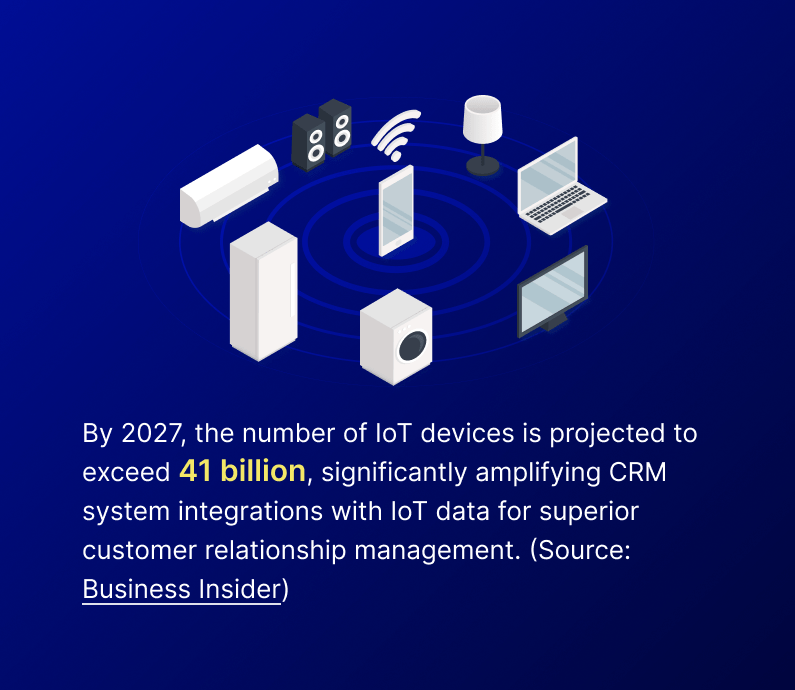
Current use cases span various industries, including retail, healthcare, manufacturing, and more. Retailers utilize IoT to track customer movements and preferences within stores, enabling personalized promotions. In healthcare, wearable devices and remote monitoring facilitate tailored patient care. Manufacturing and field service industries leverage IoT for predictive maintenance, minimizing downtime and improving customer satisfaction.
Looking ahead, the role of IoT in CRM is poised to grow exponentially. Advancements in IoT technology will enable even deeper integration into CRM systems, further personalizing customer experiences and improving operational processes. Future predictions suggest that businesses will increasingly rely on IoT data to drive decision-making, optimize customer engagement strategies, and innovate services.
Did you know that Microsoft Dynamics 365 leverages the Internet of Things (IoT) to transform businesses by driving operational efficiency and creating new opportunities? Dynamics 365, in combination with the Microsoft IoT Suite, enables advanced asset management, predictive maintenance, and personalized customer service by analyzing real-time data from connected devices.
Get in touch to Integrate
10. Social CRM Expansion
Social CRM, or social customer relationship management, is an integration of social media channels into CRM platforms, enabling businesses to engage with customers more directly and personally. By incorporating a customer's social media interactions, such as comments, conversations, and feedback, into the CRM system, companies can create a comprehensive view of the customer, enhancing communication and personalization.
One primary use case of social CRM involves monitoring and responding to customer service issues through social media platforms.
For instance, a customer experiencing an issue with a product might reach out to the company on Twitter. With a social CRM system, the company can quickly identify the customer, understand their purchase history and previous interactions, and respond appropriately—all within the same platform. This not only streamlines the process of customer service but also provides a public testament to the company's commitment to customer satisfaction.
Another use case of integrating social media and Customer Relationship Management software is targeted marketing. By analyzing social interactions and engagements, businesses can tailor their marketing strategies to individual customer preferences, behaviors, and feedback, creating more personalized campaigns. For example, a customer frequently tweeting about sustainable products might be targeted with ads and promotions for a company's eco-friendly product line.
The future of social CRM is poised for further integration and automation. As AI and machine learning technologies advance, social CRM platforms will become more adept at analyzing social media data, predicting customer behaviors, and automating responses. This will enable even more personalized customer interactions and proactive customer service, transforming social media from a mere communication channel into a pivotal component of the customer experience.
Did you know that Microsoft Dynamics 365 can significantly enhance your social media engagement? With Dynamics 365 integrated with social media through Microsoft's Social Engagement tool, you can seamlessly record and analyze social media activities right within your CRM database. This powerful integration allows your marketing, sales, and service teams to stay closely connected with prospects and customers across social platforms like Twitter, Facebook, and LinkedIn
Plan Your Social CRM Integration today
Nalashaa Digital enhanced a UK government agency's CRM with Dynamics 365 for Social Engagement and Azure Cloud Service integration for streamlined social media management and improved public service.
11. Mobile CRM Accessibility
Mobile CRM, or CRM mobile app is a CRM tool designed for mobile devices including smartphones and tablets. By connecting through mobile CRM, sales, marketing, and customer service teams have access to customer data through a mobile CRM app or via a web-based browser with cloud CRM.
This flexibility allows for real-time access to customer information, sales data, and various CRM tools necessary for on-the-go operations, enhancing the ability to conduct business anywhere at any time.
According to Nucleus Research, 65% of companies utilizing a mobile CRM successfully meet their sales quotas. Additionally, the average return on investment (ROI) for CRM implementation stands at $8.71 for every dollar spent.
A prime use case of mobile CRM involves sales professionals who travel frequently. For example, a salesperson visiting a client can quickly pull up the client's purchase history, communication records, and preferences directly on their mobile device during the meeting.
This immediate access to comprehensive customer data allows for more personalized discussions, swift resolution to any client queries, and the ability to update customer records in real-time, significantly enhancing customer interactions and opportunities for closing deals.
Looking ahead, the future of mobile CRM seems poised for even more significant advancements. With the integration of AI and machine learning, mobile CRM systems will offer predictive analytics, offering insights into customer behavior and sales forecasts. Additionally, the integration of IoT devices will provide sales teams with even more data points for understanding and anticipating customer needs.
Did you know? Dynamics 365 harnesses the power of Mobile CRM, enabling professionals to access customer engagement apps like Dynamics 365 Sales and Customer Service anytime, anywhere. Through the Dynamics 365 mobile app, users can experience the full capabilities of their CRM system on their phones or tablets, ensuring seamless business operations and customer interactions even on the go. Embrace the future of mobility with Dynamics 365.
12. Demand for Self-Service CRM
Self-service CRM is a powerful extension of traditional customer relationship management that empowers customers, employees, and partners to access information, resolve queries, and perform tasks independently through an online portal. This approach leverages technology to streamline interactions and transactions, reducing the need for direct contact with customer support or company representatives.
For example, a customer named Alex needs to return an item. Instead of calling customer support, Alex logs into the self-service portal, finds the return section, initiates the process, and follows the step-by-step guide provided. This interaction is quick, satisfying for Alex, and cost-effective for the company.
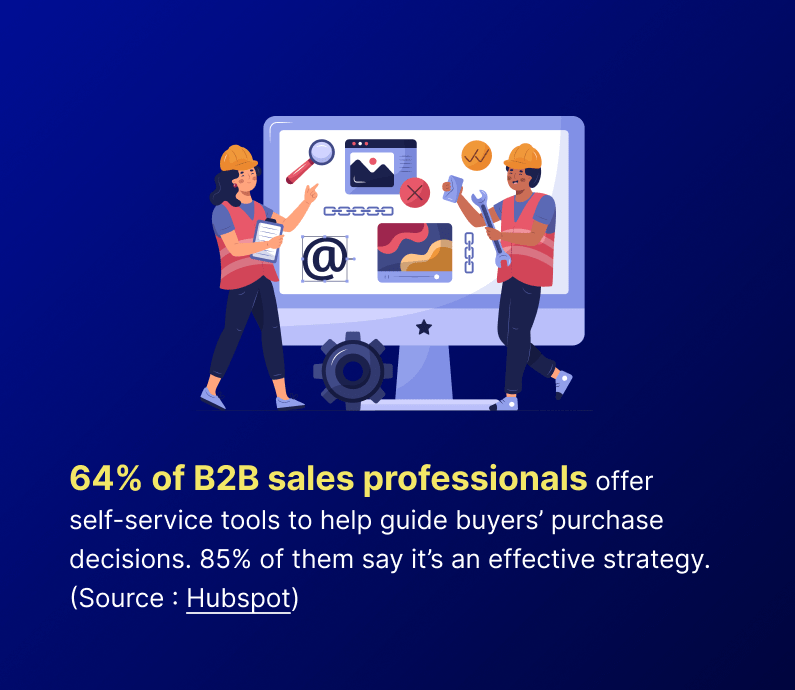
As we move further into the digital age, CRM self-service portals are expected to become even more sophisticated and integral to business operations. We can anticipate a future where self-service CRMs not only handle routine inquiries and transactions but also predict customer needs and offer solutions proactively.
Did you know that Dynamics 365 leverages portals to enhance the customer and employee experience, streamlining operations and fostering deeper engagement? Dynamics 365 portals provide a robust platform for self-service, allowing users to access information, resolve issues, and manage their interactions with ease. Whether it's customers checking order statuses or employees accessing HR resources, Dynamics 365 portals offer 24/7 access to crucial data. This powerful tool not only boosts satisfaction by empowering users but also significantly reduces the workload on support teams, making operations more efficient.
Explore Dynamics 365 Self Service Portals
Bottom Line
As we conclude our exploration of the emerging customer relationship management trends, it's evident that the landscape of CRM is evolving rapidly, driven by technological advancements and changing consumer behaviors.
At Nalashaa Digital, specializing in Dynamics 365 services, we recognize the importance of staying at the forefront of these trends to empower businesses with innovative solutions that drive growth and success. Our expertise in Dynamics 365 allows us to harness the power of these emerging technologies to deliver tailored CRM solutions that align with the evolving needs of our clients. Get in touch with us to leverage current trends in CRM with zero hassles.
